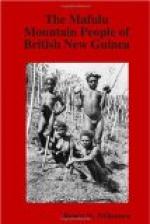VI. Interrogative.
The interrogative is only employed with reference to the verb itself, not to the complements. It changes with the conjugation and varies for present, past and future tense.
Present. Past 1. Past 2. Future 1. Future 2.
ememoma? emama? emena? emola? emoma? umbubima? umbibia? umbubina? umbubila? umbubima?
The present in the first conjugation keeps the reduplication of the stem, and changes the final e to _-oma_. The second conjugation simply adds _-ma_. The interrogative in the past simply changes the e of the positive indicative to a in both forms. The future is formed in the same way from the subjunctive with a stress upon the final a in the first conjugation.
Ex. Nuga malele yera? have you taken the book? uga nemb’ emama? has he killed the bird? nu aiti gola? would you start to-morrow? kupa g’ilama? are the potatoes cooked?
Note (1). The future interrogative replies to the question, “Can I...”? or “Should I...”?
(2). The interrogative of the near past (cf.p. 318, 3, b) is formed by substituting _-una_ for _-ua_.
Ex. nug’ em’ aliluna? Have you just come to see the village?
(3). The form of the second future as umbibia is rarely heard, except with the verb alili, see, from which comes ’Aria? see?
(4). The negative interrogative is formed like the simple negative by me or mi preceding the verb.
The questions “What should I do?” “What should I say,” How should I begin it?” are translated by the expression do(le)... maiti, from do(le)? where?
Ex. dotamaiti? how should I say? dol’ imaiti? what should I do? do yela maiti? how shall I call?
VII. Substantive Verb.
1. In the present tense there is no substantive verb. The predicate and subject are combined as in the examples already given (cf. p. 312, 2). But when the present indicates a state in opposition to one preceding it, ga is used before the adjective, or if in opposition to a future state, the verb ando follows.
Ex. Kuku ga ko, the tobacco is bad; balava ga ua, the bread is finished; indi ga kouatu, the knife is on the box; ambe g’ifa, the banana is good; ambe gos’ ando, the banana is (still) green (not ripe).
The past is more difficult to express. It always requires an adverb of time.
Ex. Mele maleke ifa, audati ga ko, the child formerly was good, now he is bad.
3. For other tenses the verb is translated only by the auxiliaries _-elele_ and _-angege_, for which cf. p. 322, 7.




